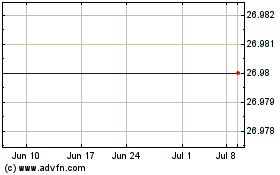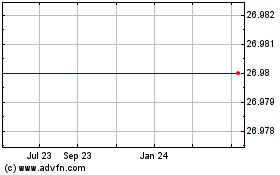Myovant Sciences (NYSE: MYOV), a healthcare company focused on
redefining care for women's health and prostate cancer, today
announced that SPIRIT 2, the first of two Phase 3 studies of
once-daily relugolix combination therapy (relugolix 40 mg plus
estradiol 1.0 mg, and norethindrone acetate 0.5 mg) in women with
pain associated with endometriosis, met its co-primary efficacy
endpoints and six key secondary endpoints. In addition, relugolix
combination therapy was generally well-tolerated including minimal
bone mineral density loss over 24 weeks.
Myovant also announced that, in a separate clinical study,
relugolix combination therapy achieved 100% ovulation inhibition in
67 healthy women with no women ovulating during the 84-day
treatment period, as evaluated by the Hoogland-Skouby
assessment scale (score < 5). Furthermore, 100% of women resumed
ovulation or menses upon discontinuation of treatment with an
average time to ovulation of 23.5 days.
“Endometriosis causes severe physical pain and emotional
distress for many women who are in need of new non-invasive
treatment options suitable for long-term use,” said Linda Giudice,
M.D., Ph.D., distinguished professor in reproductive sciences at
the University of California, San Francisco (UCSF). “The
clinically-meaningful results announced today are highly
encouraging, especially since the same dose that achieved
significant improvement in pain also demonstrated a well-tolerated
safety profile including minimal bone mineral density loss.”
In the co-primary endpoint analysis of SPIRIT 2, 75.2% of women
receiving once-daily relugolix combination therapy achieved a
clinically-meaningful reduction in dysmenorrhea versus 30.4% of
women in the placebo group (p < 0.0001). For non-menstrual
pelvic pain, relugolix combination therapy achieved a
clinically-meaningful reduction in 66.0% of women versus 42.6%
women in the placebo group (p < 0.0001). On average, women
receiving relugolix combination therapy had a 75.1% reduction on
the 11-point (0 to 10) Numerical Rating Scale for dysmenorrhea from
7.2 (severe pain) to 1.7 (mild pain).
“Building on our successful Phase 3 studies in uterine fibroids,
we are very pleased with the positive results from our first Phase
3 study in endometriosis which brings us closer to realizing our
vision of a one dose, one pill, once a day potential treatment that
balances clinically-meaningful symptom relief with a well-tolerated
safety profile for women suffering from these diseases,” said Lynn
Seely, M.D., chief executive officer of Myovant Sciences. “We look
forward to sharing the results from our replicate Phase 3 study in
endometriosis later this quarter.”
Six key secondary endpoints measured at Week 24 and compared to
placebo achieved statistical significance, including changes in
mean dysmenorrhea and overall pelvic pain, impact of pain on daily
activities as measured by the Endometriosis Health Profile-30
(EHP-30) pain domain, a greater proportion of women not using
opioids (all p-values < 0.0001), changes in non-menstrual pelvic
pain (p = 0.0012), and dyspareunia (painful intercourse) (p =
0.0489).
Relugolix combination therapy was generally well-tolerated with
minimal bone mineral density loss over 24 weeks. The overall
incidence of adverse events in the relugolix combination and
placebo groups was similar (80.6% vs. 75.0%). In the relugolix
combination therapy group, 5.3% of women discontinued treatment
early due to adverse events versus 3.9% in the placebo group. The
most frequently reported adverse events, reported in at least 10%
of women in the relugolix combination group, were headache,
nasopharyngitis, and hot flashes. There were three pregnancies in
the relugolix combination group and five in the placebo group.
Conference Call Myovant will hold a conference
call today, Wednesday, April 22, 2020 beginning
at 8:30 a.m. EDT / 5:30 a.m. PDT to discuss
results of the clinical studies. The dial in numbers are
1-800-532-3746 for domestic callers and +1-470-495-9166 for
international callers. A live webcast of the conference call will
also be available on the investor relations page of Myovant’s
website at investors.myovant.com. After the live webcast, the event
will remain archived on Myovant’s website for at least 30 days.
About the Phase 3 SPIRIT Program in
Endometriosis Myovant’s Phase 3 clinical program for
endometriosis consists of two multinational, replicate pivotal
clinical studies (SPIRIT 1 and SPIRIT 2) of relugolix combination
therapy (relugolix 40 mg plus estradiol 1.0 mg and norethindrone
acetate 0.5 mg) in women with pain associated with endometriosis.
Women received treatment either with relugolix combination therapy
for 24 weeks, relugolix 40 mg once daily monotherapy for 12 weeks
followed by relugolix combination therapy once daily for an
additional 12 weeks, or placebo once daily for 24 weeks. Eligible
women who completed the SPIRIT 1 or SPIRIT 2 studies were offered
the opportunity to enroll in an active treatment extension study in
which all women receive relugolix combination therapy for an
additional 80-week period, resulting in a total treatment period of
up to 104 weeks, designed to evaluate the safety and sustained
efficacy of longer-term treatment.
About the Ovulation Inhibition Study The
ovulation inhibition study was a Phase 1 open-label, single-arm
study consisting of a pre-treatment period to confirm ovulatory
status, an 84-day treatment period (three cycles) to assess the
effects of relugolix combination therapy on ovulation inhibition,
and a post-treatment follow-up period to determine the time to the
return of ovulation. Ovulation inhibition was based on the
Hoogland-Skouby scale.
About Endometriosis Endometriosis is an
estrogen-dependent, inflammatory disease in which tissue similar to
the uterine lining is found outside the uterine cavity, commonly in
the lower abdomen or pelvis, on ovaries, the bladder, and the
colon. This endometrial-like tissue outside the uterus results in
chronic inflammation and can cause scarring and adhesions.
The symptoms associated with endometriosis include painful
periods and chronic pelvic pain, painful ovulation, pain during or
after sexual intercourse, heavy bleeding, fatigue, and infertility.
Endometriosis can also impact general physical, mental, and social
well-being.
For endometriosis-associated pain, initial treatment options
include hormonal contraceptives and over-the-counter pain
medications. In more severe cases, GnRH agonists such as leuprolide
acetate are used for short-term treatment. An estimated six million
women in the U.S. suffer from symptoms of endometriosis, and an
estimated one million women are inadequately treated by current
medical therapy and require further treatment. Almost 200 million
women are affected globally.
About Relugolix Relugolix is a once-daily, oral
gonadotropin-releasing hormone (GnRH) receptor antagonist that
reduces ovarian estradiol production, a hormone known to stimulate
the growth of uterine fibroids and endometriosis, and testicular
testosterone production, a hormone known to stimulate the growth of
prostate cancer. Myovant is developing a relugolix combination
tablet (relugolix 40 mg, estradiol 1.0 mg, and norethindrone
acetate 0.5 mg) for women with uterine fibroids and for women with
endometriosis. Myovant is also developing a relugolix monotherapy
tablet (120 mg once daily) for men with advanced prostate
cancer.
About Myovant Sciences Myovant
Sciences aspires to be the leading healthcare company focused
on redefining care for women’s health and prostate cancer. The
company’s lead product candidate is relugolix, a once-daily, oral
GnRH receptor antagonist. The company has three late-stage
clinical programs for relugolix in uterine fibroids, endometriosis,
and prostate cancer. The company is also developing MVT-602, an
oligopeptide kisspeptin-1 receptor agonist, that has completed a
Phase 2a study for the treatment of female infertility as part of
assisted reproduction. Takeda Pharmaceuticals International AG, a
subsidiary of Takeda Pharmaceutical Company Limited, the originator
of relugolix, previously granted the company a worldwide
license to develop and commercialize relugolix (excluding Japan and
certain other Asian countries) and an exclusive license to develop
and commercialize MVT-602 in all countries worldwide. Sumitovant
Biopharma, Ltd., a wholly owned subsidiary of Sumitomo Dainippon
Pharma Co., Ltd., is the majority shareholder of Myovant. For more
information, please visit the company’s website
at www.myovant.com. Follow @Myovant on Twitter and
LinkedIn.
Forward-Looking Statements This press-release
contains forward-looking statements within the meaning of the
Private Securities Litigation Reform Act of 1995. Forward-looking
statements include all statements regarding Myovant Sciences’
intent, belief, or expectations regarding future events or results
and can be identified by words such as “anticipate,” “aspire,”
“believe,” “can,” “continue,” “could,” “estimate,” “expect,”
“intend,” “likely,” “may,” “might,” “objective,” “ongoing,” “plan,”
“potential,” “predict,” “project,” “should,” “to be,” “will,”
“would,” or the negative or plural of these words or other similar
expressions or variations, although not all forward-looking
statements contain these identifying words. In this press release,
forward-looking statements include, but are not limited to,
statements and quotes regarding Myovant Sciences’ aspirations to
become the leading healthcare company focused on redefining care
for women’s health and prostate cancer; statements summarizing
and characterizing data from the SPIRIT 2 and ovulation inhibition
studies; the expected timing of results from the second Phase 3
study in endometriosis (SPIRIT 1); Myovant’s vision of a one dose,
one pill, once a day treatment that balances clinically meaningful
symptom relief with a well-tolerated safety profile for women
suffering from endometriosis and uterine fibroids; and the
estimated market size for endometriosis and commercial potential
for relugolix combination tablet for the treatment of women with
endometriosis. Myovant Sciences’ forward-looking statements are
based on management’s current expectations and beliefs and are
subject to a number of risks, uncertainties, assumptions and other
factors known and unknown that could cause actual results and the
timing of certain events to differ materially from future results
expressed or implied by the forward-looking statements. Myovant
Sciences cannot assure you that the events and circumstances
reflected in the forward-looking statements will be achieved or
occur and actual results could differ materially from those
expressed or implied by these forward-looking statements. Factors
that could materially affect Myovant Sciences’ operations and
future prospects or which could cause actual results to differ
materially from expectations include, but are not limited to the
risks and uncertainties listed in Myovant Sciences’ filings with
the United States Securities and Exchange
Commission (SEC), including under the heading “Risk Factors”
in Myovant Sciences’ Quarterly Report on Form 10-Q filed on
February 10, 2020, as such risk factors may be amended,
supplemented or superseded from time to time. These risks are not
exhaustive. New risk factors emerge from time to time and it is not
possible for Myovant Sciences’ management to predict all risk
factors, nor can Myovant Sciences assess the impact of
all factors on its business or the extent to which any factor, or
combination of factors, may cause actual results to differ
materially from those contained in any forward-looking statements.
You should not place undue reliance on the forward-looking
statements in this press release, which speak only as of the date
hereof, and, except as required by law, Myovant
Sciences undertakes no obligation to update these
forward-looking statements to reflect events or circumstances after
the date of such statements.
Investor Contact: Frank Karbe President, Chief
Financial Officer Myovant Sciences, Inc. investors@myovant.com
Media Contact:Albert Liao Director,
Corporate CommunicationsMyovant Sciences, Inc.
media@myovant.com
Myovant Sciences (NYSE:MYOV)
Historical Stock Chart
From Mar 2024 to Apr 2024

Myovant Sciences (NYSE:MYOV)
Historical Stock Chart
From Apr 2023 to Apr 2024
